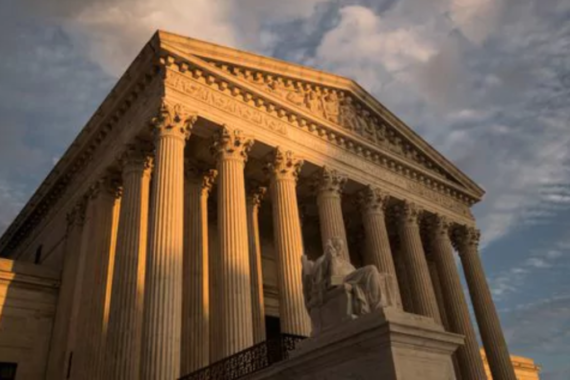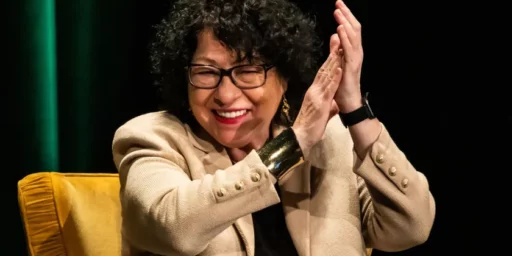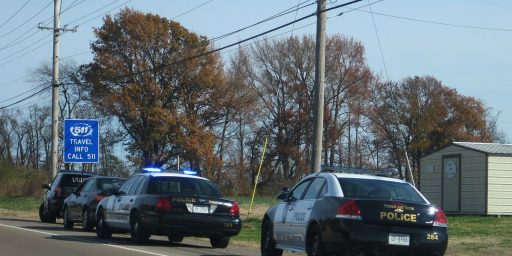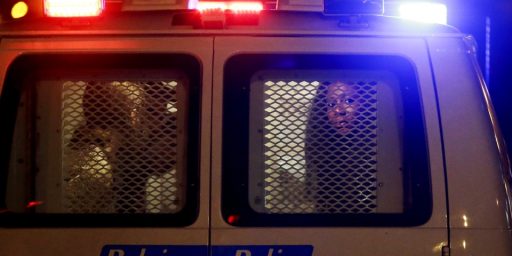SCOTUS Rejects Appeal of BLM Leader Sued For Murder by Protestor
A longstanding precedent may be in jeopardy.

AP (“Supreme Court rejects appeal from Black Lives Matter activist over Louisiana protest lawsuit“):
The Supreme Court on Monday allowed a lawsuit to go forward against a Black Lives Matter activist who led a protest in Louisiana in which a police officer was injured. Civil rights groups and free speech advocates have warned that the suit threatens the right to protest.
The justices rejected an appeal from DeRay Mckesson in a case that stems from a 2016 protest over the police killing of a Black man in Baton Rouge.
At an earlier stage of the case, the high court noted that the issue was “fraught with implications for First Amendment rights.”
The justices did not explain their action Monday, but Justice Sonia Sotomayor wrote a brief opinion that said lower courts should not read too much into it.
The court’s “denial today expresses no view about the merits of Mckesson’s claim,’’ Sotomayor wrote.
At the protest in Baton Rouge, the officer was hit by a “rock-like” object thrown by an unidentified protester, but he sued Mckesson in his role as the protest organizer.
A federal judge threw out the lawsuit in 2017, but a panel of the 5th U.S. Circuit Court of Appeals ruled 2-1 that the officer should be able to argue that Mckesson didn’t exercise reasonable care in leading protesters onto a highway, setting up a police confrontation in which the officer, identified in court papers only as John Doe, was injured.
In dissent, Judge Don Willett wrote, “He deserves justice. Unquestionably, Officer Doe can sue the rock-thrower. But I disagree that he can sue Mckesson as the protest leader.”
If allowed to stand, the decision to allow the suit to proceed would discourage people from protesting, the American Civil Liberties Union wrote, representing Mckesson.
“Given the prospect that some individual protest participant might engage in law-breaking, only the most intrepid citizens would exercise their rights if doing so risked personal liability for third-parties’ wrongdoing,” the ACLU told the court.
Lawyers for the officer had urged the court to turn away the appeal, noting that the protest illegally blocked the highway and that Mckesson did nothing to dissuade the violence that took place.
SCOTUSBlog’s Amy Howe (“Court declines to intervene in lawsuit against Black Lives Matter organizer“) adds:
At issue in Mckesson was whether DeRay Mckesson can be held responsible for the officer’s injuries when he did not directly harm the officer himself but instead organized the demonstration and, the officer said, “knew or should have known” that violence would result.
The case is one with which the justices were already familiar. In 2019, the U.S. Court of Appeals for the 5th Circuit allowed the officer’s lawsuit to go forward. Mckesson then appealed to the Supreme Court, where he argued that the lawsuit against him was barred by the First Amendment and the Supreme Court’s 1982 decision in NAACP v. Claiborne Hardware Co., which limited the NAACP’s liability for a nonviolent protest that it organized.
In November 2020, the court sent the case back to the 5th Circuit with instructions to seek guidance from the Louisiana Supreme Court on whether state law would in fact allow Mckesson to be held liable.
After the Louisiana Supreme Court issued an opinion indicating that, under the facts alleged by the officer, a protest leader could be sued for negligence, a divided 5th Circuit issued a new opinion allowing the lawsuit to go forward. Doe had alleged, the majority wrote, that Mckesson had “organized and directed the protest in such a manner as to create an unreasonable risk that one protester would assault or batter” the officer.
[…]
Justice Sonia Sotomayor penned a statement regarding the court’s decision to deny review. She noted that since the court of appeals issued its decision, the Supreme Court in Counterman v. Colorado “made clear that the First Amendment bars the use of an objective standard like negligence for punishing speech, and it read Claiborne and other incitement cases as demanding a showing of intent.” Because the Supreme Court may turn down cases “for many reasons,” Sotomayor stressed, the denial of review in Mckesson’s case “expresses no review about the merits of” his claim. Moreover, she added, the court of appeals should “give full and fair consideration to arguments regarding Counterman’s impact in any future proceedings in this case.”
Vox’s Ian Millhiser is less sanguine, crying “The Supreme Court effectively abolishes the right to mass protest in three US states.”
The Supreme Court announced on Monday that it will not hear Mckesson v. Doe. The decision not to hear Mckesson leaves in place a lower court decision that effectively eliminated the right to organize a mass protest in the states of Louisiana, Mississippi, and Texas.
Under that lower court decision, a protest organizer faces potentially ruinous financial consequences if a single attendee at a mass protest commits an illegal act.
It is possible that this outcome will be temporary. The Court did not embrace the United States Court of Appeals for the Fifth Circuit’s decision attacking the First Amendment right to protest, but it did not reverse it either. That means that, at least for now, the Fifth Circuit’s decision is the law in much of the American South.
[…]
Everyone agrees that this rock was not thrown by Mckesson, however. And the Supreme Court held in NAACP v. Claiborne Hardware (1982) that protest leaders cannot be held liable for the violent actions of a protest participant, absent unusual circumstances that are not present in the Mckesson case — such as if Mckesson had “authorized, directed, or ratified” the decision to throw the rock.
Indeed, as Justice Sonia Sotomayor points out in a brief opinion accompanying the Court’s decision not to hear Mckesson, the Court recently reaffirmed the strong First Amendment protections enjoyed by people like Mckesson in Counterman v. Colorado (2023). That decision held that the First Amendment “precludes punishment” for inciting violent action “unless the speaker’s words were ‘intended’ (not just likely) to produce imminent disorder.”
The reason Claiborne protects protest organizers should be obvious. No one who organizes a mass event attended by thousands of people can possibly control the actions of all those attendees, regardless of whether the event is a political protest, a music concert, or the Super Bowl. So, if protest organizers can be sanctioned for the illegal action of any protest attendee, no one in their right mind would ever organize a political protest again.
[…]
Like Mckesson, Claiborne involved a racial justice protest that included some violent participants. In the mid-1960s, the NAACP launched a boycott of white merchants in Claiborne County, Mississippi. At least according to the state supreme court, some participants in this boycott “engaged in acts of physical force and violence against the persons and property of certain customers and prospective customers” of these white businesses.
Indeed, one of the organizers of this boycott did far more to encourage violence than Mckesson is accused of in his case. Charles Evers, a local NAACP leader, allegedly said in a speech to boycott supporters that “if we catch any of you going in any of them racist stores, we’re gonna break your damn neck.”
But the Supreme Court held that this “emotionally charged rhetoric … did not transcend the bounds of protected speech.” It ruled that courts must use “extreme care” before imposing liability on a political figure of any kind.
[…]
And what, exactly, were the “unreasonably dangerous conditions” created by the Mckesson-led protest in Baton Rouge? The Fifth Circuit faulted Mckesson for organizing “the protest to begin in front of the police station, obstructing access to the building,” for failing to “dissuade” protesters who allegedly stole water bottles from a grocery store, and for leading “the assembled protest onto a public highway, in violation of Louisiana criminal law.”
Needless to say, the idea that the First Amendment recedes the moment a mass protest violates a traffic law is quite novel. And it is impossible to reconcile with pretty much the entire history of mass civil rights protests in the United States.
The Supreme Court’s declining to intervene in an ongoing matter is hardly novel; their taking a case is the exception, not the rule. And, if Sotomayor is not sounding alarms, it strikes me prudent as to withhold judgment. Maybe the Supremes just want the case to ripen.
Still, based on what I see in these reports, it doesn’t make sense that Mckesson should be liable for the actions of the protestor. Yes, leading the crowd onto a highway to shut it down is a criminal act unprotected by the First Amendment. Case after case after case has upheld the right of states and municipalities to place reasonable time, place, and manner restrictions on protests. But committing a relatively minor act of civil disobedience surely isn’t incitement to murder and there’s no evidence of which I’m aware that Mckessen otherwise encouraged violence. Starting a protest against police violence in front of a police station surely falls short of that.






One can’t help but notice the parallels between McKessen’s behavior and that of the former president in organizing a protest that resulted in injury (or in Spanky’s case death) of a police officer.
Could this be an attempt to establish a precedent?
Can we please fix the headline? The officer wasn’t murdered, he was injured.
Can a person already personally sue (that is, reasonably successfully) a company’s CEO for any damages they get from using a company’s product that malfunctions or has an adverse effect, or can a DA charges” some criminal charge? Is that already a right within our legal system? Barring the cost of the suit, of course.
I am thinking of the general analogy here that benefits from this ‘precedent’.
Seems to me that Louisiana wanted to send a message to BLM, and that was just fine with a 3 member panel of the 5th Circuit…the first amendment be damned. And Tony W makes an excellent observation about how this case could be applied to an overwrought political candidate whipping up a crowd of supporters to go “fight like hell.”